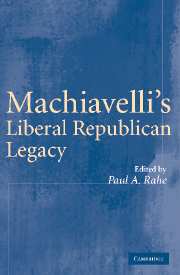Book contents
Prologue: Machiavelli's Rapacious Republicanism
Published online by Cambridge University Press: 24 July 2009
Summary
Living in Florence at the height of the Italian Renaissance, Niccolò Machiavelli wanted to do for politics what others had done for the arts and letters, namely to have “recourse to the examples of the ancients” (D 1.pref.2) in order to recover their greatness – which, to him, meant above all to imitate the institutions and policies of the Roman republic. In the Discourses on Livy (ca. 1518), he analyzed the orders and laws of the Romans to teach the youths of Italy the “true way to make a republic great and to acquire empire”; in the Art of War (1521), he proposed a reform of the military practices of his age along the lines of Roman military orders; and in the Florentine Histories (1525), he contrasted the excellence of the citizens of Rome with the corruption of the inhabitants of Florence. This concern with republics went hand in hand with Machiavelli's tenure as secretary of the Second Chancery of the Florentine republic from 1498 to 1512, and – after the republic had fallen and he had lost his post – with his subsequent visits to the Oricellari Gardens, where young patricians discussed the fate of republics, in particular their rise to greatness, the maintenance of their liberty, their inevitable corruption, and their eventual collapse.
- Type
- Chapter
- Information
- Machiavelli's Liberal Republican Legacy , pp. xxxi - lxiiPublisher: Cambridge University PressPrint publication year: 2005
- 3
- Cited by



